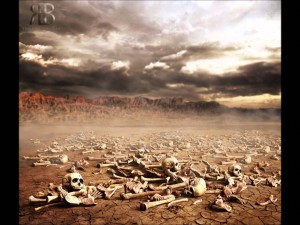13. Despised & Forsaken

He was despised and forsaken of men. (Isaiah 53:3)
Unfortunately, for most of us it was not a matter of attraction. It was about despising and forsaking. The One Who should have been loved and worshipped, was despised and forsaken.
As is often the case with Hebrew words, this word for despised cuts both ways. Despised is an act on our part: but for those of us doing the despising, we believe the object of our disdain is truly despicable. So we are not despising someone who is undeserving; rather disdain declares He is deserving of our contempt. We consider Him to be vile and worthless. Our nature is so broken, so bent, that we have revised reality to fit our own depraved perspective. If you are unable to do anything that is good (as we are), then surely no one else is capable of such. And, if you are unable to perceive good (also as we are), then neither is anyone else. The Apostle Paul speaks to this in the Romans:
As it is written, “There is none righteous, not even one; there is none who understands, there is none who seeks for God; all have turned aside, together they have become useless; there is none who does good, there is not even one. Their throat is an open grave, with their tongues they keep deceiving, the poison of asps is under their lips”; whose mouth is full of cursing and bitterness; Their feet are swift to shed blood, destruction and misery are in their paths, and the path of peace they have not known. There is no fear of God before their eyes.” (Romans 3:10-18)
Forsaken only appears three times in the Old Testament, and is translated as refused, transient, and rejected. The only option we have, once we have declared Him despised, contemptible and despicable, is to reject Him. Well… at least we are consistent.
The word for man could have just as easily been translated as mankind. Some of its other translations are every, any, and whosoever. Rather inclusive. This shows that given the chance, according to our nature, we would all despise and reject Him. And the only reason we do not is because God has changed us. And all this leads to my final question for this phrase:
Why? Why was He (and is He) despised and rejected?
First it is in our nature. That is how we are made:
But a natural man does not accept the things of the Spirit of God, for they are foolishness to him; and he cannot understand them, because they are spiritually appraised. ( 1 Corinthians 2:14)
For those who are according to the flesh set their minds on the things of the flesh, but those who are according to the Spirit, the things of the Spirit. For the mind set on the flesh is death, but the mind set on the Spirit is life and peace, because the mind set on the flesh is hostile toward God; for it does not subject itself to the law of God, for it is not even able to do so, and those who are in the flesh cannot please God. ( Romans 8:5-7)
Next, we have despised and rejected Him because our religion could not accommodate Him:
Then it happened that as Jesus was reclining at the table in the house, behold, many tax collectors and sinners came and were dining with Jesus and His disciples. When the Pharisees saw this, they said to His disciples, “Why is your Teacher eating with the tax collectors and sinners?” But when Jesus heard this, He said, “It is not those who are healthy who need a physician, but those who are sick. But go and learn what this means: ‘I desire compassion, and not sacrifice,’ for I did not come to call the righteous, but sinners.” ( Matthew 9:10-13)
“Truly I say to you that the tax collectors and prostitutes will get into the kingdom of God before you. For John came to you in the way of righteousness and you did not believe him; but the tax collectors and prostitutes did believe him; and you, seeing this, did not even feel remorse afterward so as to believe him… “Did you never read in the Scriptures, ‘The stone which the builders rejected, this became the chief corner stone; this came about from the Lord, And it is marvelous in our eyes’? Therefore I say to you, the kingdom of God will be taken away from you and given to a people, producing the fruit of it. And he who falls on this stone will be broken to pieces; but on whomever it falls, it will scatter him like dust.” When the chief priests and the Pharisees heard His parables, they understood that He was speaking about them. When they sought to seize Him, they feared the people, because they considered Him to be a prophet. ( Matt 21:23-32; 42-45)
Then Jesus spoke to the crowds and to His disciples, saying: “The scribes and the Pharisees have seated themselves in the chair of Moses; therefore all that they tell you, do and observe, but do not do according to their deeds; for they say things and do not do them. They tie up heavy burdens and lay them on men’s shoulders, but they themselves are unwilling to move them with so much as a finger. But they do all their deeds to be noticed by men; for they broaden their phylacteries and lengthen the tassels of their garments. They love the place of honor at banquets and the chief seats in the synagogues, and respectful greetings in the market places, and being called Rabbi by men…Whoever exalts himself shall be humbled; and whoever humbles himself shall be exalted. But woe to you, scribes and Pharisees, hypocrites, because you shut off the kingdom of heaven from people; for you do not enter in yourselves, nor do you allow those who are entering to go in. Woe to you, scribes and Pharisees, hypocrites, because you devour widows’ houses, and for a pretense you make long prayers; therefore you will receive greater condemnation. Woe to you, scribes and Pharisees, hypocrites! For you tithe mint and dill and cummin, and have neglected the weightier provisions of the law: justice and mercy and faithfulness; but these are the things you should have done without neglecting the others. You blind guides, who strain out a gnat and swallow a camel! Woe to you, scribes and Pharisees, hypocrites! For you clean the outside of the cup and of the dish, but inside they are full of robbery and self-indulgence. You blind Pharisee, first clean the inside of the cup and of the dish, so that the outside of it may become clean also. Woe to you, scribes and Pharisees, hypocrites! For you are like whitewashed tombs which on the outside appear beautiful, but inside they are full of dead men’s bones and all uncleanness. So you, too, outwardly appear righteous to men, but inwardly you are full of hypocrisy and lawlessness.” ( Matthew 23:1-7;12-14;23-28)
And He continued, “You have a fine way of setting aside the commands of God in order to observe your own traditions!” (Mark 7:9)
I apologize for the length, but it’s obvious why Christ condemned the Scribes and Pharisees for their religion—a religion of rules (of their own making by the way) and a religion of appearance. There was no true faith here, otherwise they would have recognized the Messiah. This was a religion filled with emotion, devoid of compassion. This was a religion of works (and not necessarily good works). This religion could not accept the Way, the Truth, and the Life. And when that happens, the consequences are everlasting. Any of this sound familiar?
So I’m thinking there has to be more reasons for despising and rejecting Christ. What about pride? Well that’s pretty much wrapped up in the human nature. And whether we squeeze the Life out of the Faith so it’s merely tradition or we re-write it to suit our needs, much of the criticism leveled at the Pharisees would apply to just about any religion that is not based upon the True Faith. Have rules become more important than relationship? How much influence does tradition or revision have on your faith?



 The next phrase in the verse is one of scope: Everyone who trusts in them. I have said and written on numerous occasions, when there is a sweeping generalization, if it is God doing the sweeping, then it must be taken literally, for He alone can address or accomplish those generalizations. So when the Father says everyone, He means everyone. No wiggle room.
The next phrase in the verse is one of scope: Everyone who trusts in them. I have said and written on numerous occasions, when there is a sweeping generalization, if it is God doing the sweeping, then it must be taken literally, for He alone can address or accomplish those generalizations. So when the Father says everyone, He means everyone. No wiggle room.